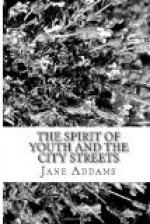This stupid experiment of organizing work and failing to organize play has, of course, brought about a fine revenge. The love of pleasure will not be denied, and when it has turned into all sorts of malignant and vicious appetites, then we, the middle aged, grow quite distracted and resort to all sorts of restrictive measures. We even try to dam up the sweet fountain itself because we are affrighted by these neglected streams; but almost worse than the restrictive measures is our apparent belief that the city itself has no obligation in the matter, an assumption upon which the modern city turns over to commercialism practically all the provisions for public recreation.
Quite as one set of men has organized the young people into industrial enterprises in order to profit from their toil, so another set of men and also of women, I am sorry to say, have entered the neglected field of recreation and have organized enterprises which make profit out of this invincible love of pleasure.
In every city arise so-called “places”—“gin-palaces,” they are called in fiction; in Chicago we euphemistically say merely “places,”—in which alcohol is dispensed, not to allay thirst, but, ostensibly to stimulate gaiety, it is sold really in order to empty pockets. Huge dance halls are opened to which hundreds of young people are attracted, many of whom stand wistfully outside a roped circle, for it requires five cents to procure within it for five minutes the sense of allurement and intoxication which is sold in lieu of innocent pleasure. These coarse and illicit merrymakings remind one of the unrestrained jollities of Restoration London, and they are indeed their direct descendants, properly commercialized, still confusing joy with lust, and gaiety with debauchery. Since the soldiers of Cromwell shut up the people’s playhouses and destroyed their pleasure fields, the Anglo-Saxon city has turned over the provision for public recreation to the most evil-minded and the most unscrupulous members of the community. We see thousands of girls walking up and down the streets on a pleasant evening with no chance to catch a sight of pleasure even through a lighted window, save as these lurid places provide it. Apparently the modern city sees in these girls only two possibilities, both of them commercial: first, a chance to utilize by day their new and tender labor power in its factories and shops, and then another chance in the evening to extract from them their petty wages by pandering to their love of pleasure.
As these overworked girls stream along the street, the rest of us see only the self-conscious walk, the giggling speech, the preposterous clothing. And yet through the huge hat, with its wilderness of bedraggled feathers, the girl announces to the world that she is here. She demands attention to the fact of her existence, she states that she is ready to live, to take her place in the world. The most precious moment in human development is the young creature’s assertion that he is unlike any other human being, and has an individual contribution to make to the world. The variation from the established type is at the root of all change, the only possible basis for progress, all that keeps life from growing unprofitably stale and repetitious.




